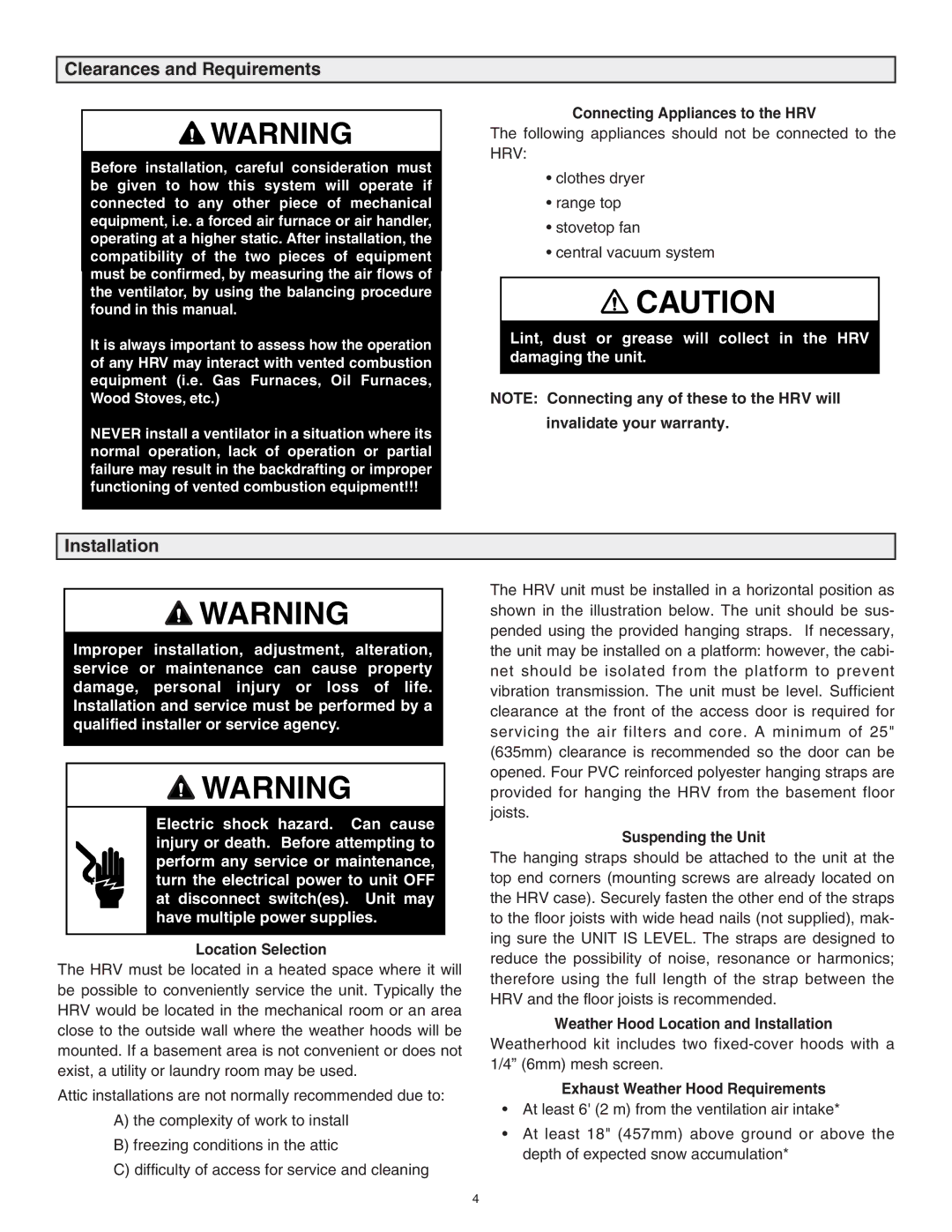
Clearances and Requirements
![]() WARNING
WARNING
Before installation, careful consideration must be given to how this system will operate if connected to any other piece of mechanical equipment, i.e. a forced air furnace or air handler, operating at a higher static. After installation, the compatibility of the two pieces of equipment must be confirmed, by measuring the air flows of the ventilator, by using the balancing procedure found in this manual.
It is always important to assess how the operation of any HRV may interact with vented combustion equipment (i.e. Gas Furnaces, Oil Furnaces, Wood Stoves, etc.)
NEVER install a ventilator in a situation where its normal operation, lack of operation or partial failure may result in the backdrafting or improper functioning of vented combustion equipment!!!
Connecting Appliances to the HRV
The following appliances should not be connected to the HRV:
•clothes dryer
•range top
•stovetop fan
•central vacuum system
![]() CAUTION
CAUTION
Lint, dust or grease will collect in the HRV damaging the unit.
NOTE: Connecting any of these to the HRV will
invalidate your warranty.
Installation
![]() WARNING
WARNING
Improper installation, adjustment, alteration, service or maintenance can cause property damage, personal injury or loss of life. Installation and service must be performed by a qualified installer or service agency.
![]() WARNING
WARNING
Electric shock hazard. Can cause injury or death. Before attempting to perform any service or maintenance, turn the electrical power to unit OFF at disconnect switch(es). Unit may have multiple power supplies.
Location Selection
The HRV must be located in a heated space where it will be possible to conveniently service the unit. Typically the HRV would be located in the mechanical room or an area close to the outside wall where the weather hoods will be mounted. If a basement area is not convenient or does not exist, a utility or laundry room may be used.
Attic installations are not normally recommended due to:
A)the complexity of work to install
B)freezing conditions in the attic
C)difficulty of access for service and cleaning
The HRV unit must be installed in a horizontal position as shown in the illustration below. The unit should be sus- pended using the provided hanging straps. If necessary, the unit may be installed on a platform: however, the cabi- net should be isolated from the platform to prevent vibration transmission. The unit must be level. Sufficient clearance at the front of the access door is required for servicing the air filters and core. A minimum of 25" (635mm) clearance is recommended so the door can be opened. Four PVC reinforced polyester hanging straps are provided for hanging the HRV from the basement floor joists.
Suspending the Unit
The hanging straps should be attached to the unit at the top end corners (mounting screws are already located on the HRV case). Securely fasten the other end of the straps to the floor joists with wide head nails (not supplied), mak- ing sure the UNIT IS LEVEL. The straps are designed to reduce the possibility of noise, resonance or harmonics; therefore using the full length of the strap between the HRV and the floor joists is recommended.
Weather Hood Location and Installation
Weatherhood kit includes two
Exhaust Weather Hood Requirements
•At least 6' (2 m) from the ventilation air intake*
•At least 18" (457mm) above ground or above the depth of expected snow accumulation*
4
